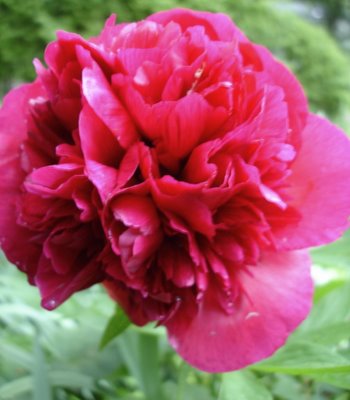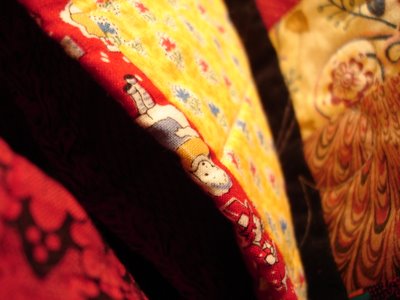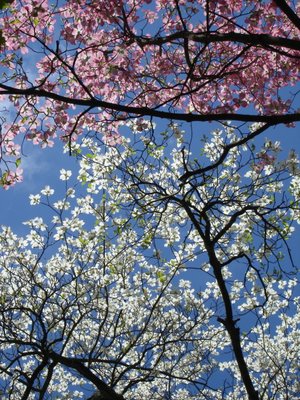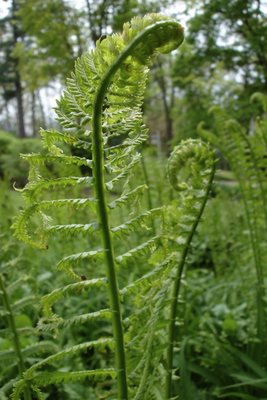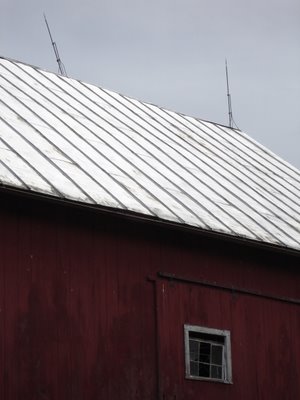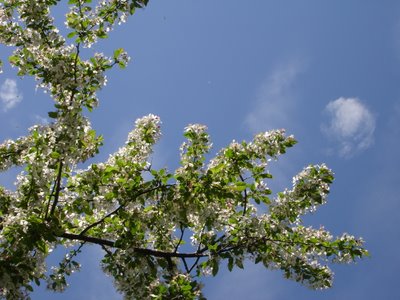Like a dragon in the sun, we'll be playing and having fun.
It is not sunny here, alas, for the kick-off of our formal commencement celebrations. And though my graduators don't read these writings, I'm going to put up the dragon--in his sunny glory from yesterday evening!--as a talisman for their festivities. For at least a couple of reasons, the dragon may be all you'll get from me today, though one never does know.
Leaving the nest.
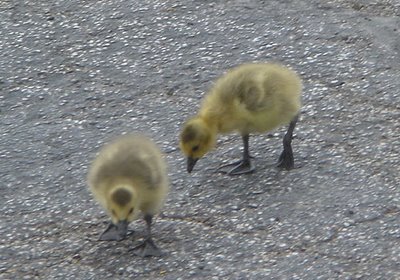
Today, I've really been feeling the fact that some students of whom I've become very fond won't be here anymore, after a couple more days. I've spent a lot of the day roaming about, doing some errands, continuing my always fruitless search for the perfect special events lipstick (tonight's story for another time), spending some time with my excellent friends. Tomorrow, our ceremonies start, and once they're underway, we're on the fast track to a relatively quiet, depopulated Gambier.
My father has sent me the perfect pictures for the way things are today. I think that I'll refrain from even offering commentary, other than to tell you that these geese live at the factory where he's working near Chicago this week. You can imagine your own captions and connections, though those captions and connections will be much funnier and probably more poignant if you know the pomp and procession of a certain kind of small college's graduation ceremonies.
The funny thing about goslings is that their feet give them away, reveal them as the creatures they'll be when they get much bigger.
Such loud darkness.

Remember how I told you that I live in a thunderstormy area? This evening, a noisy front is pushing through the county, and it took the power out about ninety minutes ago. One moment, I was talking with my mother; the next, I was conversing with white noise. I groped my way to the flashlight, thankful as ever that my memory is sharp with details like where the flashlight randomly got stowed the last time I used it (not in a logical place, I should perhaps add). I lit my way to a couple of candles. I set myself up for some reading, then realized that in the candlelight, my head was throwing an enormous shadow on the wall over my right shoulder.
Seven (slow-going, because I'm tired) pages of Housekeeping later, the electricity came back to the house. But the outage has, I think, done its part to sap the rest of my own current away for the night.
And so, two things, and then I'm departing, disembarking for another night of dreaming, perhaps.
First: when I peeked out the bathroom window this morning to see whether anything interesting was happening in the yard, I was startled to see three large, richly red deer in my backyard--reclining in a group, munching and mawing and resting together. They saw me when I padded barefoot into the kitchen to make the coffee I'd take back upstairs to bed. Within ten minutes or so, they stood up and wandered away; I caught a glimpse of only one of thier tails.

Second: here are the kinds of passages I live for, from Marilynne Robinson's Housekeeping:But the lake at our feet was plain, clear water, bottomed with smooth stones or simple mud. It was quick with small life, like any pond, as modest in its transformations of the ordinary as any puddle. Only the calm persistence with which the water touched, and touched, and touched, sifting all the little stones, jet, and white, and hazel, forced us to remember that the lake was vast, and in league with the mood (for no sublunar account could be made of its shining cold life). (112)
[W]hy must we be left, the survivors picking among flotsam, among the small, unnoticed, unvalued cluter that was all that remained when they vanished, that only catastrophy made notable? Darkness is the only solvent. While it was dark...it seemed to me that there need not be a relic, remnant, margin, residue, memento, bequest, memory, thought track, or trace, if only the darkness could be perfect and permanent. (116)
Now we're in a sonic lull: the rain has stopped, as have the flash and rumble of this May shower.
This afternoon, while I mowed the lawn, I discovered whole bushes of fat peony buds, round and taut like little rubber bouncing balls, and those bushes are pushing out toward the light, emerging from their surrounding hedge. I thought yesterday's peony a completely isolated renegade. Now, happily, it looks as though I misjudged.
Turns out Ohio is one of the top ten states in the country for lightning casualties.
source for tonight's image: the Electricians' Toolbox page promoting lightning protection.
Concatenation.
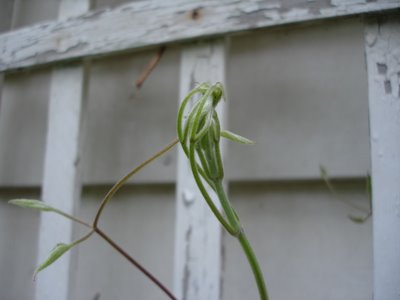
This morning, in the hour before the alarm rang, I dreamt that I learned I was pregnant. In the dream, I was traveling, both on some sort of journey with a group of people (who may have included my family) and also on my own rambles just beyond the expected parameters of that group's movement and stasis. At some point, I saw a map, and on that map, near the end of a spit of land, was the label "Dr. S." "A place named for me!" I exclaimed to someone in the dream. Strangely, I kept wandering, and at high speed, and the news of my pregnancy only complicated and intensified my desire for motion, my need to keep tracing long ovals through a rural landscape that echoed southern Indiana and mid-Ohio without ceasing. Except on the map, where everything was pure coastal fringe, water fingering coastline, interlocking saltwater and sand. The pregnancy concerned me, even in the dream: I remember trying to recalculate the flexible spending account I create with paycheck withholdings every month, thinking that it was terrible that I'd just underestimated what I'd need, only days before learning that I'd probably be spending thousands on prenatal care.
The dream itself was a sign of burgeoning, of things simmering and percolating and concatenating--all those metaphor-mixing verbs. Saturday's commencement ceremony is a massive beginning anew for the students, of course--a beginning again as non-students--but today I'm far more focused on the ways that the close of an academic year represents the rebirth of all those parts of my scholarly identity that get displaced ever so slightly by the day-to-day work of teaching and advising. An alternate set of books has been gravitating to my bags and desks this week, following me around along with the final grading I tote about. (And have I never told you that my main workbag is actually a diaper bag? That's another story altogether, as usual.)
Part of what yielded my dream of impending nativity: at a reception last night where I had a chance to interact with one of my favorite local babies, I was startled that--as I played with this child--an older friend whom I haven't seen for awhile called out to me, "No, no, not yet," obviously instructing me not to have a child now. I had never realized the degree to which being told not to reproduce could feel just as intrusive as being asked when I planned to reproduce. (I count myself blessed that no one actually asks me this question, that instead I hear about others' being asked it.)
Another part of what birthed the dream: I had a major meeting this morning to discuss my work, and while I had no real fear that the meeting would be anything but insightful, supportive, and even provocative, I can freely admit to having felt the tiniest squeeze of anxiety. The dream's suggestion bore fruit, though: the meeting was not only reassuring but even generative: I've bumped one of my major professional goals forward by about six months, a move that feels scary and invigorating all at once.
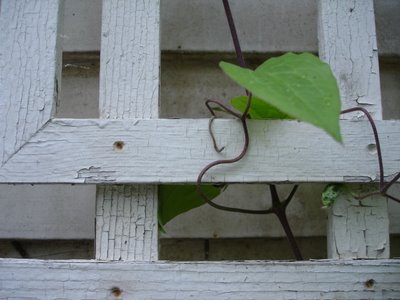
This afternoon, I was having coffee with my excellent novelist friend. We took advantage of the rain's having stopped--a cessation that continued through the afternoon and even brought with it some sun, so welcome--by sitting outside the coffeeshop. About halfway through our time out there, a cement mixer passed by, its tub spinning and spinning, as they do, always. As we walked back to the officehouse, the truck passed us going in the other direction, and I mentioned my childhood love of those trucks (and found out that his daughter loved them, too--why should this be? we wondered, deciding it might have something to do with the multiple axes along which those trucks' circular motions happen simultaneously). As a kid, I was in love with medium-sized trucks: the UPS truck; the garbage truck; and especially the cement mixer. For the hell of it, I'm going to force the analogy: it's possible that one reason the cement truck looked right and important (or right important) to me today lies in the fact that I'm continuing to embody this alternate kind of gestation process, even if only for myself, and that the closing of the semester and the opening of the summer form one of those transition points where I become more fully aware than before of all the growing and tending and nurturing I've been doing, in hidden places and at barely known times, even at my busiest moments this semester. This alternative, repetitive motion has kept going even as I've been moving straight on ahead; the stuff that needs to stay in the mix has stayed in the mix, and it's nearly time to see what's in there.
And then I slip effortlessly back to the organic analogy, because a spinning truck will only take me so far. Greening, I keep thinking to myself these days. It's all greening. I'm greening. And oh, just you wait. Just you wait and see.
Washing out.

The rain keeps falling. Just before lunch, I espied these brilliant orange flowers. At first, I passed them by, figuring I'd photograph them later. Then I realized that the rain could start again at any second. I turned around and shot these closest things to bright sunshine I've seen in days. And sure enough, by the time I was done eating lunch, it was pouring.
Flooding isn't in our forecast, and Gambier lies up a hill from the river anyway. But it feels as though the rain pouring on us is flushing out our light and lots of our colors (though not our greens, which are more vibrant than ever).
As evidence of how washed out we're getting, witness the sodden dragon.

Granted, he would seem sharper and less washed out if I hadn't ended up photographing him late in the evening again. But my least favorite effect of continuous rain is that all through the day the light never gets stronger than that of late evening.
A postscript to yesterday: I got home late this evening, after dinner and another round of grading, to find a phone message from my mother--who said, among other things, "I can give you a hint about what your next quilt will be..." That's what I forgot to tell you: the most magic thing about my mother's quilts is that they just keep on coming. She keeps on making them. She keeps on giving them to me. I have a whole legacy of her work with fabric, a whole textile tale of my life as her daughter. Seriously: when I stopped by to see her as a surprise one Sunday night last fall, she sent me back to Gambier the next morning with a new quilt. I did nothing to deserve her as my mother, but I sure am glad we ended up together.
Red hot mama.

My mother and I traveled to Boston's Museum of Fine Arts last summer to see an exhibit of quilts from Gee's Bend, Alabama. The Gee's Bend quilts had shown at the Whitney in New York City in winter 2002-03 and had been on the road pretty much ever since, as far as I knew. We managed to make it to the show on the day of a gallery talk, and so we visited the quilts twice: once in the morning, just after the museum opened, when we knew we'd have ample time to wander around, separately and together, examining the stitching and the patterns close-up and from afar. After our first couple hours of looking, we headed down the road to the Isabella Stuart Gardner Museum (a story for another night), but we went back to hear the docent's talk.
Not surprisingly, the talk was packed. Having done some docent work, my heart sank for our poor speaker, who had to find a way to move sixty people through galleries and still be heard. Her strategy, logically, was simply to park us in front of a few pieces and talk from there. Midway through her first quilt, the docent asked for questions, and a woman in the front row started trying to assert some kind of authority by talking about having met the quilters when they traveled up from Alabama for the show's opening. She praised them for having really had a sense of themselves as artists, not just as women who happened to have made quilts. And just when things started sounding as though they were going to get really condescending--these simple women from Alabama somehow became great, if somewhat unconventional, American artists! almost despite themselves!--my mother raised her hand.
For a split second, I feared that my mother was going to decimate this other woman verbally. Instead, when the docent called on her, my mother turned the conversation back to the art object on the wall. "Can you show us the back of the quilt?" she asked. Alas, it turned out that the docent had not been trained or equipped with white gloves for such interaction with the quilt. But I was so glad that my mother had turned the conversation back from a direction which seemed to suggest that the quilts' artistry or the quilters' intentionality might be questionable; with her question, she accorded both the respect of a fellow artist recognizing good work well done, and she implicitly instructed our tourmates about how to approach quilts as art. And she managed to do it without belittling anyone. My mother is like that; she's a teacher, after all, in all the truest senses of the word.
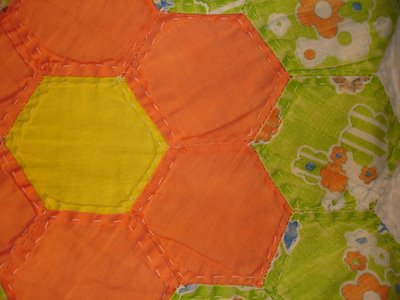
I have a long apprenticeship to quilting as an art, even though I have accepted that I myself will never be a quilter. My mother took up quilting when I was a baby; my first memories of her quilting are from the Christmas after my brother was born, when she was putting the yellow binding on the grandmother's flower garden quilt she made first. It wasn't an easy quilt to start with: grandmother's flower garden is a simple pattern, but it's a simple pattern made up of hexagons. Being that she made it in 1979, it's unsurprising to me that my mother chose the bright colors she did--lime, turquoise, gold, orange, red, all tied together with repetitions of bright white and bright yellow. Over the past few months, I've been giving a great deal of thought to the roots of my aesthetic values, and I have figured out (it was a duh! moment when it hit me, I'll tell you) that my mother's quilts have been perhaps my most important influence.
It's a particularly funny realization because I designed one of my master's exams to figure out why I am so enamored of novels in pieces--the great big nineteenth-century novels, heirs to the epistolary novel tradition, that show off their seams, their constructions out of letters, diaries, transcriptions, multiple narrators' testimonies, reflections on the past and tales of the present. I didn't get much of anywhere (though the question focused me in just the right way to see what I see in my research work). But I'm pretty sure that my having grown up surrounded by piles of fabric in various stages of being patterned--soft shards of cottons and tall stacks of blocks and fat folds of quilt-tops and hoops and frames of quilts-in-progress--might have had something to do with this fondness.
Now, one thing you learn when you're the attentive daughter of an active quilter is that the front of a quilt only tells half that quilt's story or presents half its artistry (if even that). To know what's happening on a quilt, to apprehend its patterns fully, to understand how its artist (or artists) pulled all its elements together, you have to look at the back of the quilt, as well. Hence my mother's question to the MFA docent. Hence our disappointment when she couldn't actually turn the corner back. And hence the MFA's decision to hang at least a few of the quilts in special frames that allowed visitors to examine them from both sides, which was some consolation.
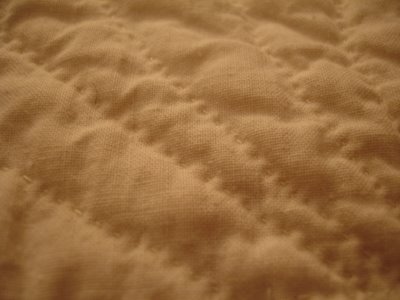
In my house, quilts have never been just about being showy, and they have never been just about being useful. Indeed, my mother's quilts are the quintessence of useful beauty. If I take into account all the times I've slept under them, lain on couches under them, and wrapped up in them in sickness and in health, I'd have to guess that I've spent well over half the days of my life being warmed by her work, generally by more than one of her quilts at a time. (There are four on this couch right now--but that's chiefly because I brought three of them downstairs for photographs, earlier. Those three will go back upstairs with me in a little while, and then I'll have five quilts on my bed again. And these are only the full-size quilts; I haven't counted up the smaller quilted hangings and runners scattered through the house.)
Growing up literally surrounded by quilts, I learned to love the quieter signs of patient labor and creative work. I learned to love tracing geometrical shapes, finding the places where patterns seemed to turn on their heads, to become altogether other than what they'd just been, places where a square resolves into two triangles or two triangles become a diamond. The front of a pieced quilt will show off its shapes more or less kaleidoscopically, depending on the nature of its patterns. But the back of such a quilt will reflect or refract or subvert or echo or utterly undo those shapes, all according to the designs of the quilter. My mother has taken tops made up of neat geometric structures and quilted them with Baptist fans, the name for a style of quilting wherein a person stitches concentric curves as far as the arm can reach before choosing a new center and starting again. The effect is a tension of curves and corners, lines radiating in semi-circles and demarcating squares, rectangles, triangles, diamonds.
When my mother started machine-quilting about a decade ago, I was not as supportive as I might have been. Her hand-quilting is tiny and lovely, and the earliest machine-quilted pieces were rough in a way that her hand-quilted ones hadn't been for years. But like any adventuresome artist, my mother kept experimenting with her medium despite my naysaying and now produces beautiful machine-quilted work as well.

It has always been easy for me to get lost in quilts; they are excellent resting places for a tired imagination, their regularities so fertile, their oddities so suggestive of lore and locale. Talking quilts with my mother also crafted a whole realm of my intellectual abilities: some of my earliest and richest conversations about color and design and arrangement--about taste, in short--were conversations about quilts, about how my mother's and my palettes differ, or about where particular blocks looked best, or about what kinds of innovations really worked and which didn't. Over the years, I have developed a massive fondness both for crazy quilts and for very regularly repetitive patterns of tiny pieces--complex double wedding rings, intricate star quilts, huge and deceptively simple nine patches. I can marvel at Baltimore album quilts but have never felt much of a desire to own one.

I'm also a fan of mavericks--quilts that take off from an established pattern, turning a well-known block into something unexpected or defiant or rebellious. During our Boston trip last summer, we ventured to the New England Quilt Museum in Lowell, Massachusetts, where we found a whole exhibit of mavericks from the past two centuries. Maverick quilts are my favorite sign of just how much experimentation and serious fun and sheer artistry was always involved in quilting, well before the Art Quilt movement (sort of the modernist movement for quilting) really got underway in the late twentieth century. (My parallels and analogies are tiring, as I tire.)
As we wandered through the NEQM's galleries, my mom and I kept doing our best to peer behind the quilts on display, to see what the stitch-flourishes looked like in different proximity to the quilt tops' surprises of pattern and color. It's because of my mother that I know to be curious about such things. It's because of her quilting that I know how to think about a big picture and a tiny detail at the same moment, and how to piece a series of tiniest details together patiently, patiently, knowing that a grander vision is emerging, long before it's visible--and how (and why) to keep lavishing care on that vision, long after it's become visible and has perhaps seemed to be almost fully realized, almost finished. And so it's through her quilts that I'm saying happy mother's day this year. I love your quilts, Mama, and I love you too.
Falling on my head like a memory.
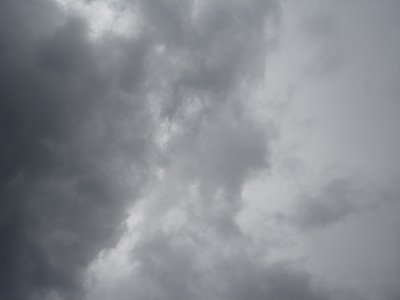
It has been raining here for 36 hours. I fell into bed last night in the midst of one brief lull in the drumming and dripping; this afternoon, we had a spot of sunshine that lasted about five minutes and some intermittent near-absence of precipitation. But for the most part, we've been getting rain, and more rain. And then, when we least expect it, more rain.
When it rains hard, my mother says, "At least you don't have to shovel rain." She speaks truth.
The final papers that trickled into my hands yesterday came with water puckers on their fronts and backs, casualties of students too fatigued to figure out good ways to keep their work dry on the walk over. I now have three neat stacks of reading on my office desk and one neat stack in the car, and eight days in which to consume the lot. This reading feels like the final fruition of a long collective labor, and for once, I'm well-rested enough to be enjoying watching their minds at play.
(The dragon is at play, as well, may I note. He has been playing hard-to-get for the past couple of days, hiding out with his back to the road, in still Sisyphean struggle with a rock just outside the house where he lives. The logistics of yard-creeping in the rain utterly defeated me, and as I drove by tonight, it looked as though he wasn't there anymore. And so you will have to take this word-picture from me: his little orangeness, braced against large grey rock, the whole tableau soaking in unceasing mid-Ohio May downpours.)
Gearing up for the first grading plunge this afternoon, I climbed into the bath with Marilynne Robinson's Housekeeping, just as the rain struck itself up yet again. I read her Gilead last summer, as part of my project of keeping up with the Pulitzers, and was startled by how much I genuinely loved reading it. Usually, I am not a book savorer. I love books above all other inanimate things; this much, I know I've made clear over the course of these months. But I tend to gulp them. I eat books like air. (No, I do not have red hair.) Particularly once I get involved with a book I'm loving, I generally want to slip in so that only my nose is above the surface, only enough to keep breathing, and I want to stroke and slice and scissor-kick without sound, without ceasing, until I catch the last full-stop. With Gilead, I both did and did not want to do my usual speeding up, an increase in velocity that kicks in around the one-third mark of most short-ish books. I was actually surprised by the turns her narrative took--and it generally takes some doing to surprise me. I'm always interested in how the narrative is going to work, but I'm generally not surprised by where it's going. But Gilead surprised me, and it moved me quite deeply. It's a story told from an older father to a very young son, and the narrative is simply suffused--it is simple, and it is full: full of love, of confusion, of reluctance and nervous anticipation and revelation and quiet. And so I'm looking to see what Robinson's first novel will do.
I lay curled and submerged for awhile this afternoon, slipping a bit on my white tub, my forearms and fingers keeping my paperback out of water's way. (I once read all of "The Lighthouse," the last section of Woolf's To the Lighthouse, underwater like that, not to mention most of the middle of Beloved, the first time I read it.) Eventually, though, the temptation grew too strong: I tossed the book away so that it wouldn't get wet later, and I slipped the rest of the way down so that only my face was out of the water. I listened to my ears filling up, felt my hair floating finely. I thought of the amount of my life I have spent underwater: years of days spent in goggles and tank suits, my feet on concrete and ceramic tile and starting blocks and diving boards, my hands pulling me over a surface or holding me up in a handstand. I thought of the time I should have broken my neck, the time I, yellow-suited, decided to dive into the city pool with my hands clasped behind my back, not realizing until it was a split second too late that in a dive one function of outstretched arms is to aim the body correctly; I thought of the jaw-jarring feeling of my head against the pool's aqua-painted bottom, of my feet finding the ground and pushing me, embarrassed and panicky, back to the surface before anyone could notice what I'd done, and of my relief at not having been hurt. It made no sense that I had done what I'd done, and it really made no sense that I hadn't paralyzed myself by doing it.
I listened to the thrum of the bathwater and my body and eventually made out my heartbeat. I thought of the summer afternoons when my fondest aspiration was to be fishlike, to get myself to the bottom of the pool and swim around on my stomach, weaving near feet, surfacing as rarely as possible.
When I sat up, the water falling from my hair was as loud as the rain.
Inconclusive endings.
I don't really have it in me to write much right now, because I've just begun the week-long process of actually saying goodbye to my graduating students. I'm happy and proud that so many of the people I've watched get stronger and smarter in the past two years are moving to the next stage of their lives, and that they're ready for it, and that they'll now be on a different footing with me (getting to call me by my first name, for instance), but the trade-off is that I won't see them anymore. The Monday night seminar group came to the house for dinner, at the end of a strange, blustery and cooling day; for the first time in my teaching career, I have a souvenir group picture of a class. The few who are already done with the final paper stayed behind for one of those games of Trivial Pursuit that just won't quit: by the time we called it quits, I'd been circling the middle of the board for quite some time, never quite able to make it back for my final question, until one student finally said, "You have to win! Now!" He was late for something else. I sent them home. I don't even have it in me to write about how this process will get more poignant with each passing year--or how strange it was to sit playing a board game with people nearly a decade my junior and to want to tell them all about the first Trivial Pursuit game I played, back before any of them had been born, the one we bought at the TG&Y in our first Indiana town, and how good it was to get the junior edition (not that we knew all the questions in the turquoise box, but at least we had a fighting chance), and how I once sat up late playing Trivial Pursuit with several of my Mormon piano teacher's seven children whose names all began with J, one night when I stayed over the night before an important recital, and how that was also where I learned the prayer stance I still like best, where one simply crosses one's arms across one's body and closes one's eyes. But instead, I just played, until the game arbitrarily just stopped, and isn't that how things go, and how they will always go, because it's all so cyclical.
And now, speaking of arbitrary stoppings, I cannot upload images. Somehow, that seems fitting; none of the ones at my disposal quite catch my melange of melancholy and relief and pride and fatigue at this moment.
Except that: now that it's Friday afternoon and the pictures are uploading again, I'm happy to be able to put up one of TG&Y, which I found linked (by means of the comments section) to a page marking the downfalls of various discount stores and retail outlets. Given my penchant for crooked drive-bys, I suspect you'll be able to see why I love this one so.
Efflorescence.
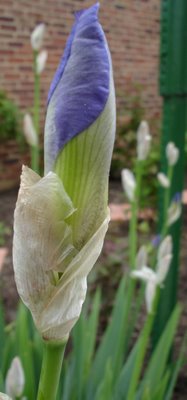 Walking around Gambier last Thursday, I noticed that our irises had put out their fat purple buds. (There are irises--and peonies!--near where the dragon lives, too. Many more people are now watching out for the dragon, because it has become known that I am watching the dragon in this space. And so the watching has become complicated, and all the more intriguing. I suspect that I myself am being watched, or watched for, or something, and I know that I have acquired some new readers (hello!) because of my dragon-watching. And I make this digression because the dragon has vanished yet again, but this time, I can't help but suspect that there's an even more deliberate art to his disappearance than there might have been before. And what is a semester's end without intrigue? I am now more titillated by than downcast about his absence. We shall all wait in no small suspense.)
Walking around Gambier last Thursday, I noticed that our irises had put out their fat purple buds. (There are irises--and peonies!--near where the dragon lives, too. Many more people are now watching out for the dragon, because it has become known that I am watching the dragon in this space. And so the watching has become complicated, and all the more intriguing. I suspect that I myself am being watched, or watched for, or something, and I know that I have acquired some new readers (hello!) because of my dragon-watching. And I make this digression because the dragon has vanished yet again, but this time, I can't help but suspect that there's an even more deliberate art to his disappearance than there might have been before. And what is a semester's end without intrigue? I am now more titillated by than downcast about his absence. We shall all wait in no small suspense.)
So. The irises.
By Saturday, the first blooms were appearing, but I was too busy couch-sleeping to document them for you. But today, I went to town--literally--and found you some flowers. My favorite of all the images:

Irises are my favorite flower, except for gerbera daisies, which are my favorite except for zinnias, which are my favorite except for snapdragons, which are my favorite except for coneflowers. What these all have in common is their big bizarreness: every one of them has something extravagant about it, even for flowers. You'll see all the others from me, in due time, because they're all going to start turning up here, particularly if I actually get my non-green thumb into action sometime early this summer and get some zinnias in the ground; they behave like weeds, so that three little plants will keep me in over-the-top bright blooms for the entire summer and half the fall semester. I'll stick with irises for now.
I'd never seen an iris before we moved to Indiana. We moved from suburban Buffalo to rural southern Indiana late one November. Somehow, my mother was able to get my great-grandmother's daffodils, which she'd uprooted from her beds in East Amherst and brought with us, into the ground promptly after we arrived, so that they could start coming up that spring in the back of the backyard, alongside our low stone wall. We knew what would come up where she'd planted, then. But we didn't know what else might appear; perennials in new properties are fun that way, as my Kentuckian friend is discovering to her delight these days, while her roses and irises bloom their magentas and indigos.
The secrets awaiting us were irises and lilies of the valley, of which we had a whole bed right behind our house. Lilies of the valley have a heady, heavenly scent. Irises, on the other hand, have no scent at all. But they have a particular profusion of petals like nothing else I know: curls up, curls down, furry polleny tongues, multiplicities of veiny colors and soft textures. They seem relatively unassuming when you first see their buds. And then, all of a sudden.
And I do mean all of a sudden. Ten years ago, near the end of my year in England, I was exclaiming over the irises we were about to have lining a long section of my walk home from the library. I had been in exile from irises for some eight years, since our departure from our first Indiana home. (We moved into a new construction, at the newest edge of a subdivision built on an old farm. There were no perennials in our vanguard, no surprises in the spring of 1989.) Kenyon always had a profusion of iris buds when I left campus at the end of spring finals, but I never saw them bloom until the year I graduated. I can trace the warming of our climate by the two-week creep that has happened in the past decade: the flowers that I could count on only at the very end of April were in full force by mid-month this year, and the irises I never saw as a student I am getting to relish well before commencement. And so seeing all of these iris buds in Exeter was terrifically exciting: they were obviously going to bloom within days, and I would get to walk past them and around them and beside them multiple times every day, simply in the course of getting to and from my studying for exams.
One Saturday night, as I walked home with the person to whom I had devoted my eager heart months earlier (he was starting to get the hint) (I have such a history this way--tenacious and single-minded in all things that matter to me), I came upon an iris stem that had snapped (or, more likely, had somehow been snapped). I took this opportunity to snag the tight-budded stalk for myself, feeling deeply transgressive as I rationalized my way back to my flat.
One more bit of backstory: during my first year at Kenyon, I strolled out one April evening with my then-somebody and came back with three daffodils we had picked outside a college building. "Oh my God!" someone exclaimed when we walked into my dorm. "Didn't you know they'll fine you like $50 apiece for cutting the flowers?" I had no idea. I looked at my $150 bouquet of daffodils and hoped that my dormmate was exaggerating in the usual freshman way.
I was fairly certain that a similar fine would be threatened at me by someone (who? someone. just someone.) if I was caught bearing this single iris stem, even in the deep blue late-May English dusk. I hurried the stem into my room and put it in a glass and watched it lovingly for the next twenty-four hours, when I could take breaks from making index cards and rereading nineteenth-century texts, in preparation for the upcoming week's exams. And then, Sunday evening, while I was out of my room for just a few minutes--checking my e-mail down the road, I think, or asking a friend a question about something exam-related--the iris bloomed. It had been on the brink of blooming for so many hours, and then suddenly it went, opened, unfurled, transformed, became itself, became the self it had been all along, packed together so tightly and carefully and simply. It was so lovely that I took pictures. And now I have taken a picture of my picture, because it's in my album from that year and scanning would be too much of a project. It's a bizarrely cropped image because I took it at an angle, in order to keep the flash from reflecting right into the image, and because I didn't want to cut out all the things that are so telling to me about this picture. Look, and then I'll tell:
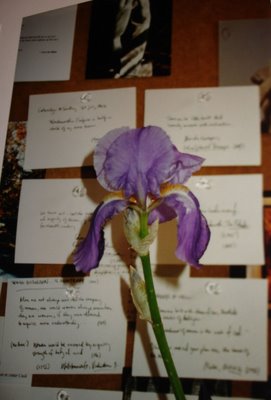
Here's what's funny to me: in this picture are many things about which you've already heard from me, or about which you're going to hear in the near future. At the left is the edge of my photograph of the tree with the lights in it, about which I told you back in December. And just underneath it is one of the wallsful of quotes I had hanging all around me throughout college; that one is from Annie Dillard's Pilgrim at Tinker Creek, and it's entirely probable that it's the passage about the tree with the lights in it. The index cards behind the flower are all things that I had hung up to help me think about my nineteenth-century examination. The one whose writing I can most clearly make out is the bottom left: "SEXUAL DISTINCTION IS...ARBITRARY," a quote from Mary Wollstonecraft's Vindication of the Rights of Woman to which I draw my students' attention every fall.
 At the top center of the image is my favorite end-of-roll knock-off photo of all time, a flashless picture I had taken of Auguste Rodin's "La Cathédrale," one of my favorite sculptures of all time, at the Rodin Museum in Paris that March. (I should perhaps clarify that I hadn't known "The Cathedral" before I went to the Rodin Museum. It was one of those breath-catching encounters, and I was plainly and simply thrilled when my camera turned out to have caught what I saw and loved.) That picture still hangs in my house, though now in an enlarged and framed version. I'm giving you someone else's rendition of the sculpture here, though, so that you can actually see it properly--no photograph of a photograph will do this one justice.
At the top center of the image is my favorite end-of-roll knock-off photo of all time, a flashless picture I had taken of Auguste Rodin's "La Cathédrale," one of my favorite sculptures of all time, at the Rodin Museum in Paris that March. (I should perhaps clarify that I hadn't known "The Cathedral" before I went to the Rodin Museum. It was one of those breath-catching encounters, and I was plainly and simply thrilled when my camera turned out to have caught what I saw and loved.) That picture still hangs in my house, though now in an enlarged and framed version. I'm giving you someone else's rendition of the sculpture here, though, so that you can actually see it properly--no photograph of a photograph will do this one justice.
To the left of that photograph is a sheet of paper bearing the lyrics to my favorite song by Over the Rhine, a Cincinnati-based band that had just come back onto my radar, after a couple of years away, because of this person with whom I was smitten. (For the song whose lyrics are on the wall, go here and listen to the sample of "Eyes Wide Open.") And guess whom I've just booked a ticket to see in concert--I'm talking, just booked the ticket three hours ago. Over the Rhine, opening for none other than... Hem. Yes. I have wanted to see Over the Rhine in concert ever since I missed the show they played at Kenyon in fall 1993; I missed it because of a combination of stress-related digestive mess and overwork, the two things that I have spent much of the past thirteen years trying to militate against (particularly in combination with one another). And you all know how I've been wanting to see Hem. To have them just have announced dates when they'll appear together, within reach of me? A small gift from somewhere.
My point this evening, if point there is: it would seem to be the case that I am now who I always was, right down to the things with which I surround myself. Where I once had just the bulletin board in my English flat for tacking up my favorite passages and pictures, the raw material of ramblings and musings to come, I now have this Cabinet. I can't help but turn to the analogy that's begging its cheesy heart out to be made here. It would seem to be the case that I, not unlike these irises I watch for every year, had all these things curled up in myself in impossibly neat order and compact relation, all waiting for the moment when I turned my back for just a split-second. And in that moment--you know, the split-second in which I went to graduate school, wrote a dissertation, started a job, and finally started settling in to my life--in that blink of an eye, what was packed tight seems to have unfurled, dropped, started shaping itself into just what I hoped it would all be. And now that I've turned back, I continue to stand and stare, eyes wide open, smiling all to myself and savoring signs of what's in store.
source for tonight's Rodin image: Vasco Guerra's tribute to Rodin. Also: usually I figure on your getting my allusions, but Over the Rhine has never had the national audience it should have had, and it's nearly impossible to get their debut album Till We Have Faces, and so I'll tell you--lest anyone should discover this on his/her own and think I'm just trying to rip them off--that my last line here is a composite of my favorite OTR lyrics, from my two favorite songs of theirs--"Eyes Wide Open" and "I've Been Slipping," a song from their second album. "I've Been Slipping" also features the lines "I've been climbing branches and vines / Gathering leaves for long festoons," which I've always loved. Also "I've been busy gathering wood / Hoping our fire will burn all the more." You all know I'm a sap. You've known this for months, if not much longer. And as sappy songs go, this one's terrific. In fact, I'm going to go listen to it right now.
This one's for you.
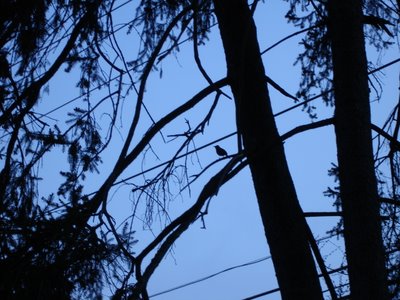
Like the rockin' cool verse-spinning DJ I am in my fantasy life (in which people are just as likely to trip out to Hopkins and Whitman as to the latest dance mix), I'm sending this one out to my good friend Four Inches of Ego, at this close of the first day that's seen me open the windows and all the doors, letting the sun and the breeze into the house and my loud dishwashing music out of it. And just remember: if you don't like it...
Ars Poetica?
I have always aspired to a more spacious form
that would be free from the claims of poetry or prose
and would let us understand each other without exposing
the author or reader to sublime agonies.
In the very essence of poetry there is something indecent:
a thing is brought forth which we didn't know we had in us,
so we blink our eyes, as if a tiger had sprung out
and stood in the light, lashing his tail.
That's why poetry is rightly said to be dictated by a daimonion,
though it's an exaggeration to maintain that he must be an angel.
It's hard to guess where that pride of poets comes from,
when so often they're put to shame by the disclosure of their frailty.
What reasonable man would like to be a city of demons,
who behave as if they were at home, speak in many tongues,
and who, not satisfied with stealing his lips or hand,
work at changing his destiny for their convenience?
It's true that what is morbid is highly valued today,
and so you may think that I am only joking
or that I've devised just one more means
of praising Art with the help of irony.
There was a time when only wise books were read,
helping us to bear our pain and misery.
This, after all, is not quite the same
as leafing through a thousand works fresh from psychiatric clinics.
And yet the world is different from what it seems to be
and we are other than how we see ourselves in our ravings.
People therefore preserve silent integrity,
thus earning the respect of their relatives and neighbors.
The purpose of poetry is to remind us
how difficult it is to remain just one person,
for our house is open, there are no keys in the doors,
and invisible guests come in and out at will.
What I'm saying here is not, I agree, poetry,
as poems should be written rarely and reluctantly,
under unbearable duress and only with the hope
that good spirits, not evil ones, choose us for their instrument.
Berkeley, 1968
--Czeslaw Milosz
Seriously: one of the things that this poem and George Eliot's Daniel Deronda (which I bring up because 4"oE is reading it right now) have in common is their attention to what it feels like to be between projects, on the cusp of a new life goal, in the midst of an attempt at vocation--what it feels like to be possessed by a greater force, but perhaps not quite to understand how or why you're being possessed just yet, or what it feels like to want to be possessed by some greater goal, even if you don't yet know what it will be. "How difficult it is to remain just one person," Milosz notes. "[I]nvisible guests come in and out at will." Eliot's Mordecai waits on that bridge for the visible guest to appear, to join with him, to be the figure he's anticipated. A difficult grace is required of us if we're going to go along with that idea of having the will and the spirit and the belief but not yet the vessel, the vehicle, the means, the mover. But keep going back to the bridge at sundown, my friend. (And do not become tubercular.) The boat will come along. What you're waiting for will materialize.
The dragon sleeps tonight.
8:22 p.m., Gambier.


The logistics of this photograph are perhaps not clear: the dragon is indeed lying on his right side, atop one side of his stone circle (right where he stood in his wee dragon house, two weeks ago). And once again, the low quality of the image is directly attributable to the low light of late evening, and to my strange fidelity to an undeclared intention of not using artificial light to portray the dragon.
They fly through the air with the greatest of ease.
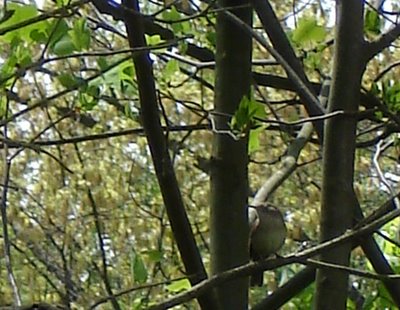
Today was a day for watching things fly. I spent the night and the better part of the day on my couch; by the time it was sunny again outside, I was awake and upright again, alternately reading my excellent book and looking out my back windows at the variety of animals darting about, building nests and finding food and making small noises.
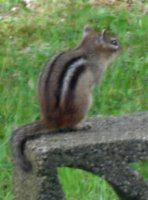 First, there was the chipmunk on my patio. Do you know that chipmunks chirp like small birds? I learned this fact last summer when I was taking care of my landlord's family's parakeet. The parakeet would sing along with or reply to other birds' calls and songs. But she always ignored the most persistent chirp of all. One day, I looked out the side window and realized that the sound was coming from a chipmunk perched on the patio step. Today, the chirping offender sat atop the decorative blocks that edge my patio, and my rattling the window could not deter his birdlike sound, which he made for hours straight--and though I am an exaggerater to the core, I am not exaggerating this detail.
First, there was the chipmunk on my patio. Do you know that chipmunks chirp like small birds? I learned this fact last summer when I was taking care of my landlord's family's parakeet. The parakeet would sing along with or reply to other birds' calls and songs. But she always ignored the most persistent chirp of all. One day, I looked out the side window and realized that the sound was coming from a chipmunk perched on the patio step. Today, the chirping offender sat atop the decorative blocks that edge my patio, and my rattling the window could not deter his birdlike sound, which he made for hours straight--and though I am an exaggerater to the core, I am not exaggerating this detail.
The next animals of real note were among my favorites for the day: the house wrens who are building a nest in my yard's birdhouse, which has stood empty the whole time I've lived here. Now, it seems possible to me that this picture of said birdhouse reveals that there are two species of birds competing for this prime piece of Gambier real estate, because the bird in this picture doesn't seem to have the right beak for a wren. It looks more like a finch or even a house sparrow to me. But the bird at the top of this post, the bird in the tree, looks to me like a wren. And these birds certainly sounded like wrens to me. I thus cannot account for a finchy looking bird on the house; I can only think back to the time in March when I doubted a cardinal was a cardinal, simply because I was looking at him from an unusual angle.
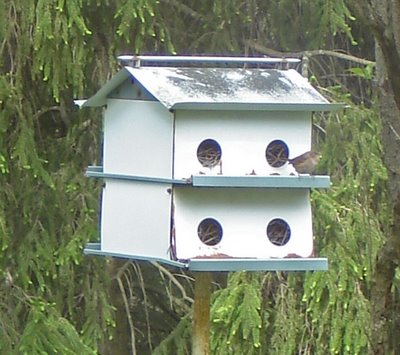
Watching the birds, I found that the super-zoom feature on my camera came in handy, though it also left the pictures looking less crisp than I'd have liked. (Having shot the birds through a house window might also have had a negative impact on my photo quality.)
I have now erased the fatigue that forced this writing's early termination last night (it is Monday, but I will continue writing a Sunday writing, and today will simply be a double writing day--because it can be! because, sorrow and relief and loss intermingled, I will not spend three hours tonight guiding fourteen young people through what some of them affectionately call big fat novels).
What I faced yesterday morning, regarding these flying and cheeping and singing things, was a quandary: I could not get a good look at them from within the house, but even the quietest slipping out through the back door would have been enough to startle them out of countenance. Binoculars, of course, would have been the logical solution to this problem of indomitable distance. But, entirely appropriately, to my mind, I have always had trouble with optics. I can only rarely force my severely myopic and astigmatic eyes to focus correctly through binoculars. I have tended simply to close one eye and look at whatever two-dimensional image I get. I have felt this difficulty as a sorrow all my adult life.
I felt it even in my adolescence, when my biology class turned to dissection and microscopic investigation of tissue, and I could not focus the microscope and see what I knew would astound me. I had a microscope when I was eight, a white and black plastic instrument with both a reflecting mirror to illuminate specimens with natural light and also a small electric bulb that could do the job more reliably (though it also introduced an element of heat that could not have been scientifically sound). I loved the microscope more than my chemistry set, more than almost anything, for that first winter I had it. It came with a yellow box of pre-prepared slides. Many of them didn't resolve into anything interesting when I looked at them, but one in particular I looked at over and over. Had Nabokov not gotten to the realm of forgetfulness first and sanctified it for all future would-be autobiographical artists, I would feel worse than I do about not being able to remember whether that favorite slide was a drop of blood or a shard of wing. It's possible that there were two and that I loved them with equal passion. My mother helped me peel the diaphanous inner skin of an onion and mount it on one of the blank slides--this set even came with tiny bottles of dye for the purposes of preparing different kinds of specimens--and I loved its miniscule rainbows, made huge under my lenses.
That was before I got glasses, now that I think about it--and suddenly a writing about flight becomes a writing about near-sightedness. I somehow limped my way through nearly all of fourth grade unable to see the chalkboard from the back of the room. In April, my teacher finally caught me working a math problem in my head instead of reading an answer from the board--this, after I had already missed all of the Spanish some visiting high school students had come to teach us once a week, and after I had missed who knows what else because I didn't realize what was happening to my vision. Now, my vision is as sharp as it could be, when corrected, and as near to blind as I care to go, when not. I heard someone say recently, "My eye doctor told me that if I hadn't gone to grad school, I'd still have 20/20 vision." (I suppose I must have been in Ottawa.) By the time I reached grad school, my eyes had already degenerated to nearly as bad as they are now--but perhaps that fact speaks more to my having always wanted to be a grad student, even before I knew what graduate school was.
My microscope sat on the yellow wooden table of my childhood, under the back window of my yellow-flowered bedroom, and during the winter of my eighth year, I spent hours poring over whatever was under my lens. Two years later, I would egg my young brother on to become my research partner in studying the Titanic, about which we would write a research paper for who knows what venue--the immense court of world historical knowledge gleaming vaguely in the galloping-growing back of my mind, I suspect, an immense court that had much to do with the burgundy leather and gilt set of World Book encyclopedias in which I studied everything from Indiana to the French Revolution to sex. (That was how I learned: sitting on the rust-colored sofa, on an evening when my family's friend came over to fry up fish for our dinner, cross-referencing on a hunch and cross-referencing some more until, oh, there, and really? that?) My research desires also had a lot to do with my Scholastic Books biography of Marie Curie, who once read a book at her family's dining room table with perfect, unshakeable concentration while her siblings stacked all the other dining room chairs in a tower behind her, just to see if they could rattle her. (She didn't look up until they toppled the chairs.) I wanted to be that focused, that concentrated; it is a longstanding ideal, you see.
And so I suppose that I was swallowed by some resurgence of an old, youthful desire, sitting on my couch watching these tiny birds flitting to and from the birdhouse, looking them up in Sibley and Audubon, listening to birdsong via Cornell's All About Birds site (which talks about wrens' "skulking habit," something that makes me love wrens even more), taking pictures with the super-zoom and then zooming in on my images to see what extra details I could find that way. But not being able to figure out with certainty what I was watching--what bird it was, bearing stick after stick to the birdhouse (unused these two years), then having to figure out how to get these too-long sticks into the top-right apartment that they've settled on, then flying off to find more sticks--was a major frustration.
And then:
Then, a yellow butterfly drifted into my field of vision, alighting first on the purple lilacs, then on the white, making the loveliest and strangest of contrasts, flitting and then flattening onto the yard's flowering cones. And then I had two creatures to identify. The butterfly dangled tantalizingly, delicately, beneath a lilac for a little while; I thought about having missed the lilac festival completely while I lived in Rochester, where the annual lilac festival is a major, traffic-stopping event. I would drive near the lilac-filled parks at dusk, slowly, with the windows down, breathing and breathing and thinking about Ohio, thinking about leaving the city, flitting near the flowers but never really landing to imbibe them properly.
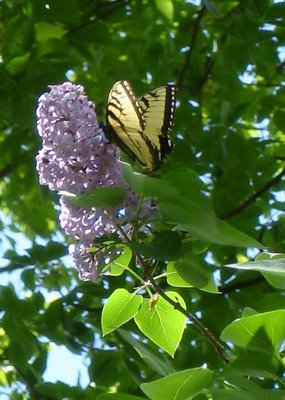
The yellow butterfly, it seems, is a Tiger Swallowtail, something I ascertained through yet more long-distance photography (grateful, for the first time, that I chose the camera with the longest digital zoom range available last year). But for this one, I eventually ventured outside and crept near--only to anger the wrens who were hanging about in the trees near the lilac and who raised a loud complaint to their companions across the yard and would not accept my apologies for having trespassed on their space.
Back in the house, I watched for the rest of the afternoon (as I continued reading my excellent book) while the air lived its way through the day: the maple tree seeking to propagate its kind; the swallows cutting the upper blue with their wings so like knives, daggers, small scythes; the wrens bearing stick after stick; the small insects, visibly relieved that winter is over and the sun is so high for so long, darting and dipping and alighting and alighting and alighting.
Roly poly fish heads.
Back in February, I gave you the lyrics to the surreal 1980s pop classic "Fish Heads." Tonight, puttering around in the strange trove of treasure that is YouTube, I have unearthed the Barnes and Barnes film--not a video, a film--for this song; it was directed by and starred Bill Paxton, of all people. The song itself starts at about the two-minute mark. If this one wasn't a part of your youth, I'm happy to be your pusher. Try it. You'll like it. The first time's free.
And besides: everybody's doing it. Just say yes. (They don't play drums.)
Today has been a day of couch-lying and phone-talking. And reading. And napping. I took a supremely good nap, like a long cat luxuriating in the world's largest sunbeam, for about two hours this evening. With this kind of view from my couch, and with a funny cold spell settled over Gambier, I didn't feel particularly compelled to get out from under the couch quilt.
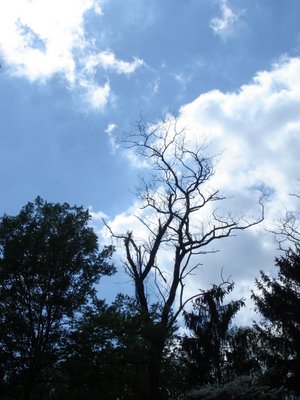
Last night, in my dreams, I stole someone's writing desk. But that's a story for another day, possibly tomorrow.
And then there were none.
I haven't even been able to tell you that the dragon disappeared two days ago. But, just when I thought I was going to have to offer a picture of his absence...

We had a local food event on campus this afternoon; it was meant to teach us where our food comes from. Local farmers brought herbs and vegetables and took orders for organic lamb and beef. There was even a display of vintage tractors. One farmer's sign greeted us, and it was so sunny and I was so giddy with the relief of finishing my teaching for the semester (tomorrow, I read a book! a whole book!) that I let my picture-taking elbow get in on the action--either that or someone intruded upon my image, which happened repeatedly during the afternoon, as you'll soon see. But first:
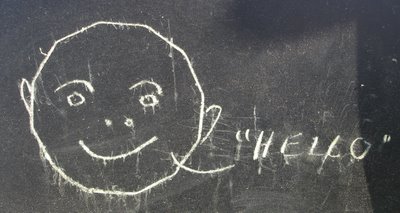
The single best part of the event, to my mind, was the kennel of chickens, which turned out to be pretty difficult to photograph: they moved so quickly and so unexpectedly, these chickens! Plus, colleagues and students abounded everywhere I turned, so my mind was divided among a variety of conversations and this ongoing process of trying to get a good close-up image of the chickens, especially the black and white ones, whose feathers lay in such patterns--all without disturbing them any more than they were already disturbed by the occasional passing-by of dogs.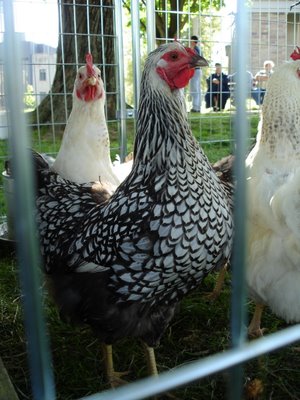
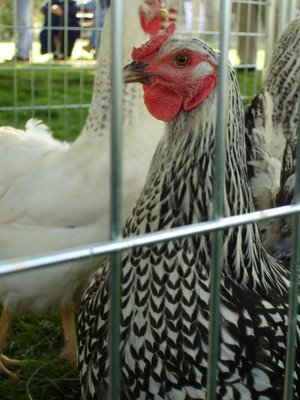
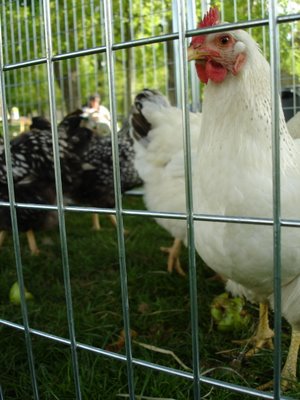
And then it was time for another enviably delicious dinner with my friends and their superb and gifted dogs. And then, on the walk home, as if the day hadn't been exceptional enough--kicking off as it did with the soft sight of a deer strolling through my neighbor's yard, glimpsed as I headed to the store to buy ingredients for the pancake breakfast with which my youngest students and I celebrated the semester's end today--I realized that now when the breeze blows, the sound that drifts to the ground is a slipping hush of new leaves, so green.
My favorite request of the day: "Talk to me about pie." But watch out. Once I start, there's no turning back. And theorizing pie-making? Yes, please.
Birthday candles for your next year.
It is thirteen hours since I wished you happy birthday, you friend of mine who will always be two weeks younger than I, as long as we both shall live. The air is cold tonight; I have walked my tipsy circuit from dinner with a parent to a bookstore laugh with a student to the spring-dark newly leafy gravel path to the library. I have studied the faculty art in the library basement, loving that at 11 p.m. I am out and alone and carrying my stack of books and peering at the strange strands of hair and braided wire and transparencies that build one woman's art, the funny square frames and pop culture collages (complete with plastic army men and astronauts!) that make one man's. One photograph shows a woman and a child, the woman presumably a mother, the child presumably a son, the mother holding out to her son the halves of a broken arrow while he ignores her. There are bodies and relationships and disasters and ecstasies everywhere I turn. I turn to leave.
Outside, it is still dark, and still cold; the coating of considerable heat that the library has provided cracks and falls away within seconds of my stepping out of the building's circles of light. I head back to the officehouse, which has been so different without you this year, and I keep on wondering how the rest of your day was, after the walk to school and the elevator ride and the closing of the office door and the turning to your version of this semester's endgame.
I thought of you all day. I thought of you when I realized the horse chestnuts are blooming, right near where I took your picture last year, right where we walked by to get our snacks on Wednesday evenings. Did you know their flowers are called candles? When I first saw them, as I strolled around London the summer I lived there researching, I was sure they were some utterly alien flower that never appeared in the U.S.; instead, I'd simply never seen them bloom. When you see them from afar, they look like monstrous conic lights in these trees whose leaves are already simply so large.

But up close, each candle is a multitude, a plenty of white and yellow and pink. When I approached the tree to take its picture, a breeze struck up, and I had to laugh at our funny dance, this branch and I.

(I will admit that I did not think of you as I photographed this oak, but I'm putting the picture in anyway, because maybe your oak looks like this oak now.)

I thought of you when I looked for poems about chestnut candles and found this one, so right:
A Birthday Candle
Thirty today, I saw
The trees flare briefly like
The candles on a cake,
As the sun went down the sky,
A momentary flash,
Yet there was time to wish
--Donald Justice
I thought of you when the mother at dinner toasted her son, across the table, and talked about getting ready to turn 50, and I thought of this big year but also about where we might be when we can say, "Now we are 50."
But now we are 30.
Best of all, I think, I thought of you and the nest in your dogwood tree when I started reading John James Audubon's essay "The Pewee Flycatcher," in which he observes in minutest detail the nesting pewees on his Pennsylvania plantation:
Their mutual caresses, simple as they might have seemed to another, and the delicate manner used by the male to please his mate, riveted my eyes on these birds and excited sensations which I can never forget.I thought of you this afternoon, too, when I saw the ferns outside the office house unfurling, stretching out fronds and stems, now that their moment has come round yet again. How do they know to be so patient? How do they uncurl so beautifully, just when it's time?
The female one day spent the greater part of the time in her nest; she frequently changed her position; her mate exhibited much uneasiness; he would alight by her sometimes, sit by her side for a moment and, suddenly flying out, would return with an insect which she took from his bill with apparent gratification. About three o'clock in the afternoon I saw the uneasiness of the female increase; the male showed an unusual appearance of despondence, when of a sudden the female rose on her feet, looked sidewise under her and flying out, followed by her attentive consort, left the cave, rose high in the air, performing evolutions more curious to me than any I had seen before. They flew about over the water, the female leading her mate as it were through her own meanderings. Leaving the Pewees to their avocations I peeped into their nest and saw there their first egg, so white and so transparent--for I believe, reader, that eggs soon lose this peculiar transparency after being laid--that to me the sight was more pleasant than if I had met with a diamond of the same size. The knowledge that in an enclosure so frail, life already existed, and that ere many weeks would elapse, a weak, delicate and helpless creature, but perfect in all its parts, would burst the shell and immediately call for the most tender care and attention of its anxious parents, filled my mind with as much wonder as when looking towards the heavens I searched, alas! in vain, for the true import of all that I saw.
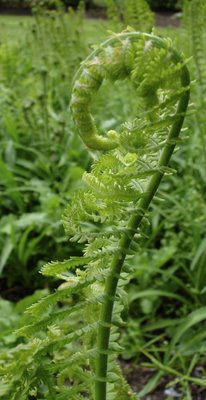
For your next year, I wish you the flash of chestnut candles and the patience of ferns.
Wednesday's sights are not full of woe.

Today, perfect: sun out, sky blue, air cool but not cold, warm but not hot, perfectly neutral. Students tired but still eager, if you find the right thing to teach them: today, paintings as literary adaptation, and what it looked like when Victorian women fell (at least as far as popular paintings saw it). Now, at the end of the day, insects hurl themselves repeatedly at my lighted living room windows. Their buzzing wings and glass-smacking recall to me the blue glow of the bug zapper that hung outside my bedroom window in East Amherst--its purplish light, its electrified grid, its snap and sizzle. It's an angry buzz I'm listening to tonight, the sound of frenetic frustration.
Today, the walking: up and down the road, again and again. In the last instance, walking up to see what I could see.
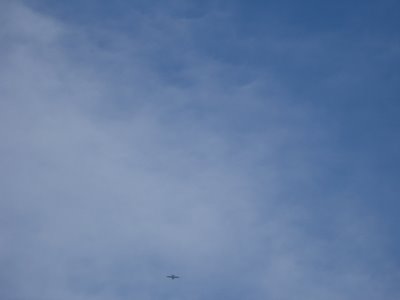
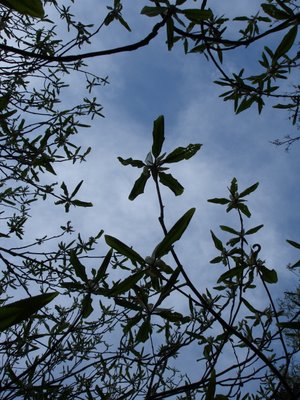
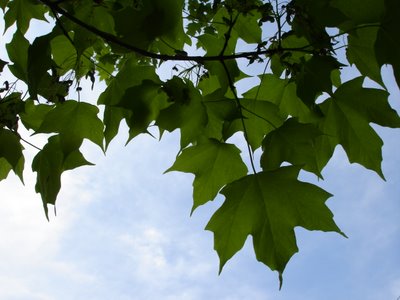

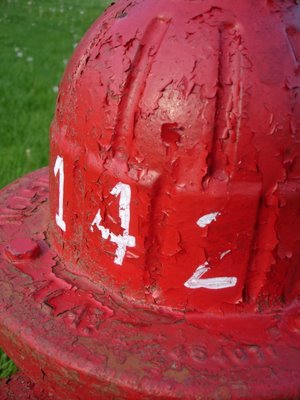
With twenty-five more pages about Beast Folk and the sinister taste and taint of blood, I will be done with my semester's reading assignments.
And one of the day's finds: Ryan Adams and the Cardinals' Cold Roses (2005). After a lifetime of disliking country music, for reasons I will expatiate upon some other time but which are not entirely unlike my reasons for having disliked reggae for so long, I find myself gravitating more and more toward things that get labeled "alt-country," which feels like a way of saying "it's country, but I like it, so it can't really be country"--but is also a way of saying "some serious genre-crossing is going on here." This one's the length of a double LP; it came out as two nine-song CDs, which has turned out to mean that it's a ridiculously cheap iTunes purchase. And at any price, it would be perfect for dancing one's way out of the midday sun and into the officehouse in order to keep things interesting for the woman who holds our whole show together.
I know some things about rainstorms.

They leave loudness behind them.
They whiten the very air.
Somewhere there is someone whose hands are even smaller than the rain.
One sure did a number on that poor itsy bitsy spider (and how did all of us not learn that neither narrative nor time is necessarily nonlinear, singing that circular song repeatedly in our youth?).
Afterward, the very ground can seem stunned, pounded cruelly into color, pushed to the extremity of its potential, but they make manifest the toughness of flowers (all but those ready to rain petals down on the road, or on some black bough, that is) (the flickering eyes of my students yesterday, until even I looked over my shoulder to see petals slipping in streams past the window. "I thought it was snowing," one said).
Shoes worn too long in rain that's too heavy develop a squelchiness under the foot's ball, under the big toe. Even once they're dry, these shoes may still feel raw and damp.
Today we had three, two of them dramatic. The third was the most dramatic; it washed the fine yellow film of tree pollen from my car and left the roads steaming.
From a distance, they look like the hanging frayed edges of clouds, a shaggy draining, a smudgy dragging down. Watching them approach is different from watching snowstorms approach, or approaching them yourself. Approaching a snowstorm--say, in a car, on a highway--you move into a white silence. Approaching the rain, or being approached by it, you encounter a pounding darkness.
In southern Indiana (and, to a lesser extent, in central Ohio), their summer versions often go thundersome and flashy. In my childhood Julys, I would lie silent and still in my yellow-flowered bedroom and watch the silhouetted oak trees pitch and thrash and hurtle (horizontally, circularly, impossibly) in night-storms. Lightning flashes would wake me up; the rending devastation of thunderpeals would keep me paralyzed and unable to return to sleep. I would calculate the heights of trees, the lengths they would travel if thrashed too hard, uprooted or torn or toppled. For years I was sure my death would come when tree met roof.
Last spring, a flash and crack in my backyard, twenty feet behind the house where I sat reading (heedless of those old lessons about not sitting beside windows during storms). There, a branch, hanging, the old join exposed, juicy pale tree flesh, the leaves still green, still growing. A week later, it was shriveled, dead; a year later, it still hangs.
Listen: when you see the flash, start counting: one-one thousand; two-one thousand; three-one thousand. When the thunder crashes or growls or rumbles, divide your count by five. That's how close the storm is.
This afternoon, as I turned my head to look left: a straight white slash through the eastern sky's furrowed dark grey. And the angry slapping kind of thunder, the hotly resounding exclamation, immediately. A storming right over us.
The T trip from Park Street station to Harvard Square takes enough time that a rainstorm--a quite heavy one, even--can drive in from the south and stage a surprise meeting with you at the top of the escalator.
The steam radiator in my Ithaca bedroom sounded to one person like a rainstorm, which he liked. We once sloshed through an agonizingly wet Ithaca Festival Saturday. It was anything but pleasant. I refused to read signs; my morning of reading and rain-listening while he napped, curled loosely and smelling warmly of fitful dreams, had seemed so safe, so dry.
They are best near large bodies of water, water meeting water in a fleet of bubbles and ripples and an infinity of small rat-tatting slaps.
They are also best when a field has gone so dry that a fall of water comes as a relief not just to the dusty earth and the desirous spears of cornstalks.
They are worst when unexpected, unheralded, bone-soaking, spine-chilling, relentless, falsely relenting, destructive. (When a library burns, what hurts the books most is not fire but its extinguishing.)
In nineteenth-century novels, handling a trip out in the rain poorly can kill you, or make your family seem foolish and marriage-desperate. In twentieth-century films of nineteenth-century novels, handling a trip out in the rain poorly can lead to something like quasilesbian pseudoeroticism.
They are the best excuse for doing what you most wanted to do anyway: sit quietly and cozily with a book. Then again, I might really be thinking of myself on that one.
All allegories and similes concerning her began and ended with birds.

I am on the brink of fantasizing about what I will do when classes end, to what I will fly.
Let's go over the brink together, shall we?
(First: at the seminar table, a revelation: "I got an e-mail from someone who saw you walking around on Friday night and thought you were on a date! He was like, 'I mean, do you think she was? She was all dolled up, and her hair looked nice!' And I said, 'Well, yeah, probably she was!'" Laughter and laughter from me. I looked pretty much the same as always, as we strolled through campus Friday evening. The difference was that I was animated and happy, walking with my dear friend, showing him where I live. The difference was that I was acting my age, without reference to my students, and the ones who saw me could sense it. "I saw you too," another student said, "and I tried to calculate where our paths would cross, and what I would say if I actually did run into you." So now I know how to break the news to everyone, should there ever be a somebody who sticks around: take a Friday evening walk. As if I didn't already know.)
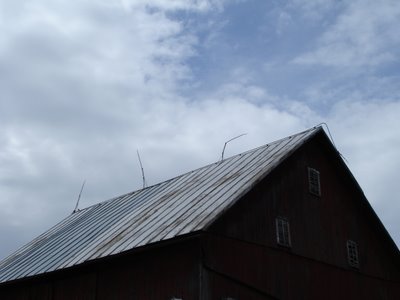
When Friday rolls in and I've finished having my last class meeting here at the house (a morning class on memory deserves indulgence in one of my favorite traditions, the pancake breakfast, and if they're lucky, they'll get faces in profile, with chocolate chips for eyes), I want to start reading again. Geraldine Brooks's March won the Pulitzer for fiction weeks ago, and I bought a copy the same day. But it's been sitting on my bed ever since. I've started feeling my way into Czeslaw Milosz's work--poetry but also memoir--but haven't gotten nearly as far as I'd like, just tiny touches to sustain me into the weekend. From the last poems, a book of agedness: "I should now be wiser than I was. / Yet I don't know whether I am wiser." "Let reality return to our speech." "So strange, the self-loving 'I' of men and women that adores itself in mirrors." And the title poem:
So, I will read poetry. And I will read novels (the new Peter Carey comes out a week from tomorrow!). And I will sleep, having finally taken the time to dig my bed out from under its accumulations, to put the threadbare flannel away for the summer and bring out the percale, the soft crispness that's best for scissoring one's legs in during summer waking. I will walk out and stare at the sky while the air is still cool and light, before the heavy, hot damp settles in for the summer.Second Space
How spacious the heavenly halls are!
Approach them on aerial stairs.
Above white clouds, there are the hanging gardens of paradise.A soul tears itself from the body and soars.
It remembers that there is an up.
And there is a down.Have we really lost faith in that other space?
Have they vanished forever, both Heaven and Hell?Without unearthly meadows how to meet salvation?
And where will the damned find suitable quarters?Let us weep, lament the enormity of the loss.
Let us smear our faces with coal, loosen our hair.Let us implore that it be returned to us,
That second space.--Czeslaw Milosz
And I will write. Such writing I hope to do this summer. And picturing. And walking.
And I will call everyone, just everyone.
And I will calm, and that will be the best part, the steadiest part. Several years ago, writing to my beloved Brooklynite, I figured out the precise way anxiety and loneliness felt: like a small, fluffed and trembling bird, fluttering just behind my sternum. This year, it really is just like sticking with everything through the last stage of a migration: the scenery is still lovely, there's good food of all sorts just ahead, and there's nothing to do but keep pushing determinedly onward.






